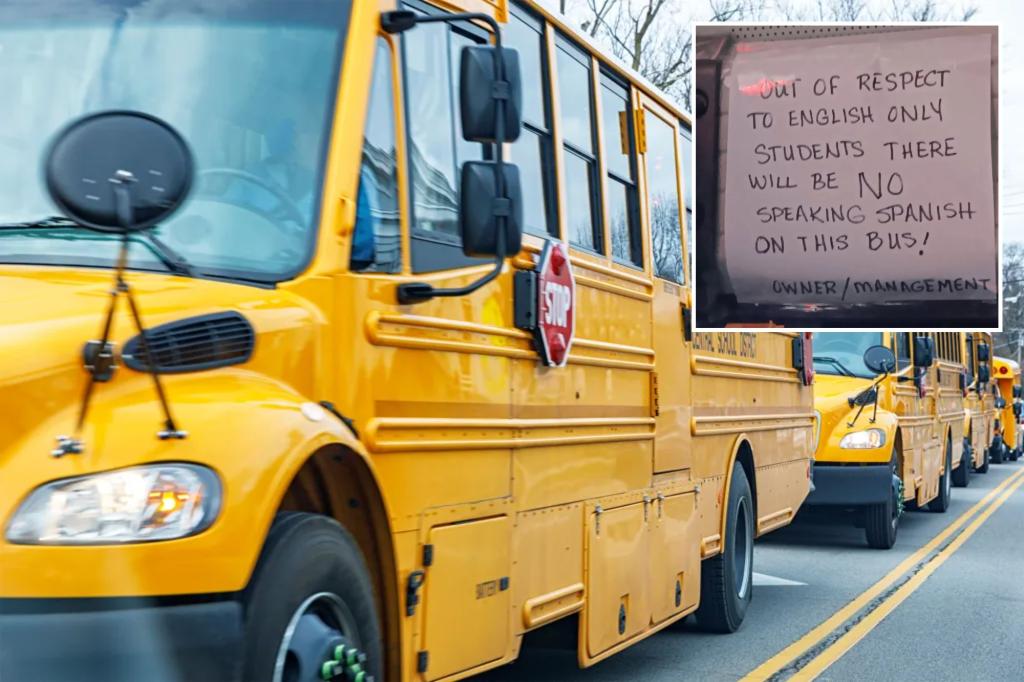The tranquility of a Pennsylvania school district was shattered this week by the discovery of a discriminatory sign on a school bus, explicitly forbidding students from speaking Spanish. The handwritten note, proclaiming “Out of respect for English only students there will be NO speaking Spanish on this bus!”, ignited a firestorm of outrage among parents and community members. The incident unfolded in Juniata County, a predominantly white area where, according to the latest US Census data, 94% of the 23,500 residents identify as Caucasian. While Hispanic and Latino individuals constitute the second largest demographic group, they represent a significantly smaller portion of the population, numbering around 900. The duration for which the sign was displayed remains unknown, but its presence sparked swift condemnation and immediate action.
The sign, purportedly signed by the “owner/management” of the bus, led to the immediate suspension of the bus operator by Rohrer Bus, the company contracted by the Juniata County School District to manage transportation services. Both the school district and Rohrer Bus vehemently denied any involvement in the creation or posting of the sign. Rohrer Bus issued a strongly worded statement emphasizing that the discriminatory message contradicted their company values and commitment to inclusivity. While the identity of the bus operator remains undisclosed, Rohrer Bus confirmed their suspension as a precautionary measure pending a thorough investigation.
The incident has spurred both the school district and Rohrer Bus to launch separate investigations. Superintendent Christie Holderman assured the community that immediate action was taken to address the situation and prevent future occurrences, though the specifics of this action were not immediately disclosed. Rohrer Bus, in response to the incident, pledged to implement enhanced training programs focused on diversity, equity, and inclusion to prevent similar incidents in the future. The company reiterated its commitment to fostering a respectful environment for all students, families, and staff, regardless of language or background.
This incident highlights the tension that can exist between dominant cultural norms and the diverse linguistic realities within communities, even in areas with relatively small minority populations. While English is the dominant language in the United States, the suppression of other languages, particularly in an educational setting, raises significant concerns about inclusivity and respect for cultural diversity. The incident underscores the importance of ongoing education and training to ensure that all members of a community, particularly those entrusted with the care and transportation of children, understand the importance of creating a welcoming and inclusive environment. The seemingly small act of posting a sign prohibiting Spanish on a school bus reveals deeper underlying issues of prejudice and intolerance that must be addressed.
The repercussions of this discriminatory act extend beyond the immediate impact on the Spanish-speaking students. It sends a chilling message to all minority groups within the community, creating a sense of alienation and fear. The incident also underscores the potential for unchecked biases to manifest in harmful ways, even within seemingly innocuous settings like a school bus. The fact that the sign was reportedly posted by someone in a position of authority – the “owner/management” – further amplifies the gravity of the situation. It highlights the need for continuous vigilance and proactive measures to combat prejudice and discrimination in all its forms.
The investigation into the incident will likely focus on identifying the individual responsible for the sign and determining the extent of their actions. It will also be crucial to assess the broader climate within the school district and the transportation company to ensure that this incident is not symptomatic of a larger, systemic issue. The commitment to implementing diversity, equity, and inclusion training is a positive step toward fostering a more inclusive environment. However, true change requires a sustained commitment to addressing underlying biases and promoting a culture of respect and understanding for all individuals, regardless of their language or cultural background. This incident serves as a stark reminder of the ongoing work needed to create truly equitable and inclusive communities.










